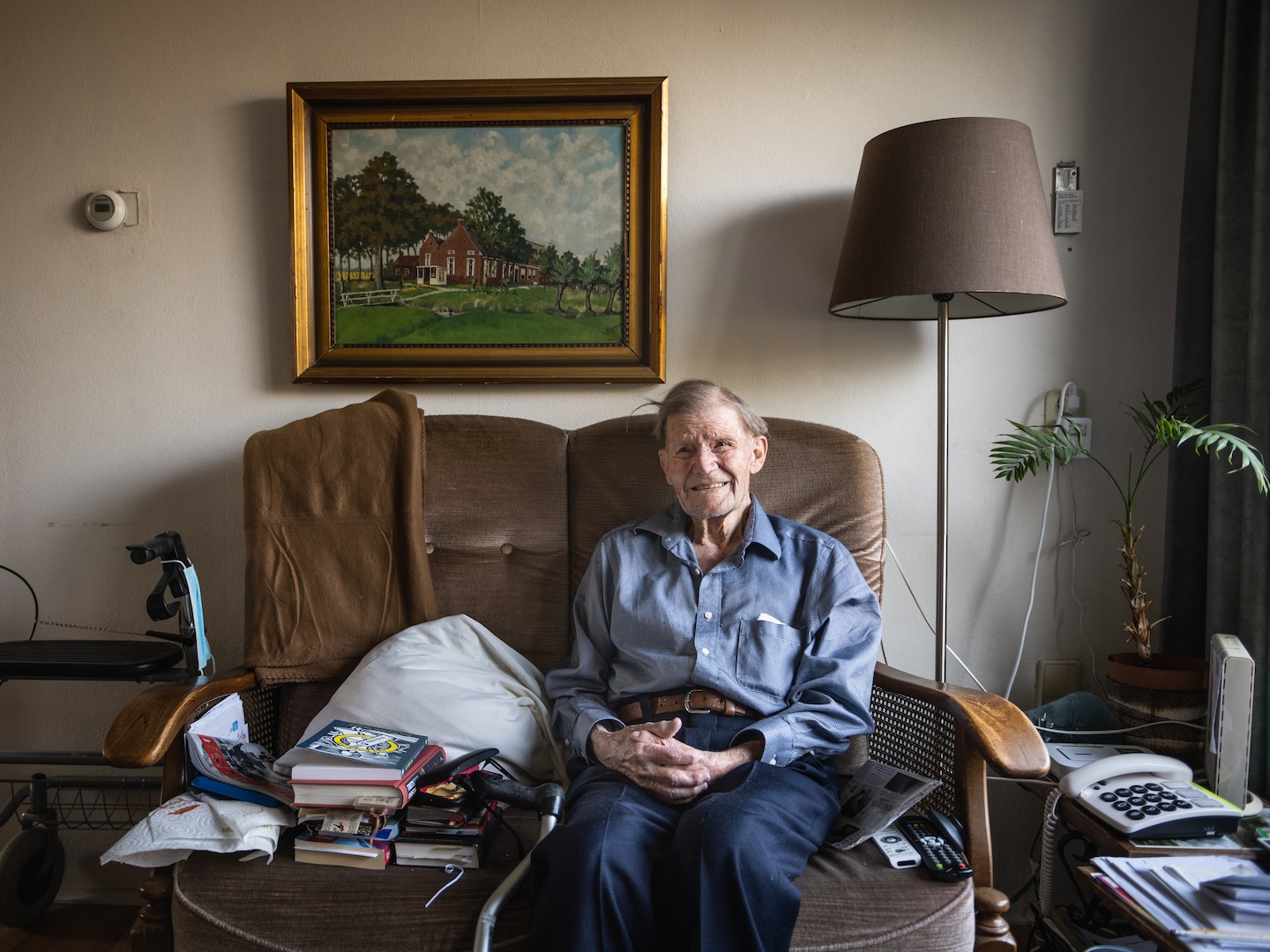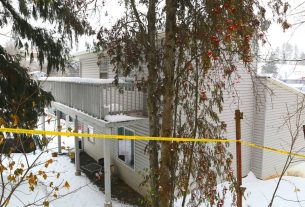Maarten van Gestel, a journalist for the Dutch newspaper Trouw who chronicled Mr. Luitjens’s story in a podcast released last year, said a caretaker informed him on Dec. 15 of Mr. Luitjens’s recent death. Other details were not immediately available. Stripped of his Canadian citizenship, Mr. Luitjens had lived in Lemmer, a town in the north of the Netherlands, since his release from a Dutch detention center in 1995.
As the last Nazi collaborator imprisoned in the Netherlands for wartime crimes, Mr. Luitjens represented “the end of a chapter,” Van Gestel remarked in an interview.
Decades into his years as a fugitive, he became known as “the terror of Roden,” a reference to the city where he had worn the black uniform of the Landwacht, or Land Guard, a Dutch paramilitary group that helped the Nazis arrest Jews, resistance fighters and other targets of the Third Reich after Germany invaded the Netherlands in May 1940.
More recent evaluations of Mr. Luitjens’s life, however, have presented him not as the notorious war criminal suggested by his moniker but rather as a person like many others of his generation who were drawn in by National Socialism and served as functionaries in the Nazi apparatus that killed 6 million Jews and millions more victims across Europe.
“I regret that at that time I had an ideology,” Mr. Luitjens said in a Dutch courtroom in 1992, “which I did not know would finally lead to the murder of so many people.”
Jacob Luitjens was born April 18, 1919, in Buitenzorg, in what was then the Dutch East Indies, now Bogor on the Indonesian island of Java. His father belonged to the Dutch Reformed Church, and his mother was a Mennonite, although they were not particularly observant.
The family moved to the Netherlands in 1923, according to Van Gestel, and settled in Roden, where Mr. Luitjens grew up. His father, a veterinarian who cared for the livestock of impoverished local farmers, became a figure of influence and authority in the community.
In an article published this year in the Mennonite Quarterly Review, historian David Barnouw described Mr. Luitjens’s father as “a fanatical supporter of the Dutch National Socialist Party” and one who “actively collaborated with the Germans during the occupation.”
Jacob, who was 21 at the time of the invasion, joined his father as a member of the Dutch Nazi Party. So did a younger brother. “It was either communism or National Socialism,” Mr. Luitjens said years later.
After studying law at the University of Groningen, Mr. Luitjens volunteered for service in the Waffen-SS, the military branch of the German SS. He was turned away, apparently because of a deformity in his left hand and arm, a feature that would make him acutely memorable to the people he later arrested while serving in the Landwacht.
Mr. Luitjens was not accused of personally carrying out the arrests of Jews, Van Gestel said. His activities, according to Van Gestel, centered on members of the underground resistance and Dutch citizens who had gone into hiding to avoid forced labor in Germany, among others. Resistance fighters he arrested were often taken to a villa where they were interrogated and tortured by the so-called Blood Squad.
“People were very afraid of them,” said Barnouw, an emeritus researcher at the NIOD Institute for War, Holocaust and Genocide Studies in Amsterdam, referring to the Landwacht. “They knew the surroundings, and the Germans, of course, did not.”
Fewer than 25 percent of Dutch Jews survived the Holocaust, according to the U.S. Holocaust Memorial Museum, which described them as “doomed” by “the ruthless efficiency of the German administration and the willing cooperation of Dutch administrators and policemen.”
Mr. Luitjens confessed that he participated in the pursuit of two people, a Dutch resister and a German military deserter, both of whom ultimately died. But he insisted that he had “not personally killed anybody.”
As Roden and the surrounding area were liberated in 1945, Mr. Luitjens turned himself in on his 26th birthday. He was interned in Westerbork, a former Nazi transit camp then in use as a prison for collaborators. He escaped the following year and fled to a Mennonite refugee camp in Germany.
In 1948, Mr. Luitjens was tried in absentia in a Dutch court, convicted of aiding the enemy in wartime, and sentenced to life in prison. By that time, he had already left Europe, sailing from Germany to South America earlier in the year with more than 750 Mennonite emigrants, according to Barnouw’s research.
Aboard the ship, he met his future wife, Olga Klassen, with whom he had three children. A complete list of survivors was not immediately available.
Mr. Luitjens lived for years as a devout member of a Mennonite colony in Paraguay, at first under the assumed name of Gerhard Harder. He worked as a teacher and raised cattle, also providing basic veterinary services that he had learned from his father. He became a “very respected member of the community,” Van Gestel said, and believed that he reckoned with his sins before God.
In 1961, Mr. Luitjens immigrated to Canada and became a Canadian citizen a decade later. He studied ecology and biology, taught botany at the University of British Columbia and belonged to a Mennonite congregation in Vancouver.
An investigation into Mr. Luitjens’s wartime actions was reopened in the 1980s as the governments in Canada, the Netherlands and countries around the world came under increasing pressure to bring suspected Nazi war criminals and their collaborators to justice before age or infirmity made their trials impossible.
After years of legal wrangling, the Canadian government in 1991 revoked Mr. Luitjens’s citizenship on the grounds that when he entered Canada and applied for naturalization, he had concealed his membership in the Landwacht and his 1948 conviction. Mr. Luitjens maintained that no Canadian authority had inquired about his wartime background and that he was unaware of his postwar conviction until more than two decades after he entered Canada.
In 1992, nearly half a century after his original conviction, Mr. Luitjens was deported to the Netherlands and imprisoned in Groningen. He was released after 28 months because of his age — he was 75 at the time — and in light of the lesser sentences served by many Nazi collaborators convicted of similar offenses.
In the immediate aftermath of the war, Van Gestel said, many Nazi sympathizers in the Netherlands were treated with “unexpected grace” because “the country had to rebuild, and people had to live with each other again.” Among the collaborators imprisoned and released in those years were Mr. Luitjens’s father and brother.
Mr. Luitjens was not permitted to return to Canada, nor was his Dutch citizenship restored, leaving him stateless. He lived in Lemmer, tending his garden and going to church, the curtains of his home pulled closed.
When a reporter for the Ottawa Citizen interviewed him in 1997, he blamed “sinister Jewish forces,” in the journalist’s paraphrase of his antisemitic remark, for the turn his life had taken.
But in conversations with Van Gestel during the year or so before his death, Mr. Luitjens appeared open to a degree of introspection. He did not fully denounce Nazism but said he regretted the persecution of the Jews, and he spoke obliquely about a wish to “leave behind” the “bad things” of the past.
In their final conversation, last spring, Mr. Luitjens commented that perhaps his story offered hope that “a monster can also become a normal person again.”



